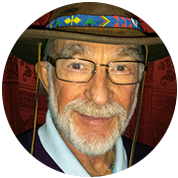The casual reader may have difficulty making sense of these sermons without some background in the religious movement to which they belong. The following is a brief outline of that background. Much more information is available on the Unitarian-Universalist Association’s website, UUA.org.
Unitarian-Universalism is a religious movement formed in 1961 by the union of Unitarians and Universalists into a single organization. Both the Unitarian movement and the Universalist movement flow from the Congregationalist wing of the Calvinist Protestant tradition, but each took a very different turn during the 19th century.
Unitarianism is named after the unitarian Christian interpretation declared to be heresy during the reign of Constantine I. The original movement considered that there was only one god, that the father, the son and the holy spirit were all really one. In the late 18th century, the congregationalist movement, especially in New England, moved dramatically in the direction of Deism – a belief in a clock-work world set in motion by a now-absent god – which was an essentially Unitarian view of god. The Transcendentalist tradition arose in reaction to the mechanistic view of the Deists, and two more modern versions of Unitarianism – Ethical Culture and Humanism – arose in the late 19th and early 20th centuries as the movement continued to evolve.
Universalism was a vastly popular movement in the mid-nineteenth century, based on the doctrine that a loving god would not condemn any human soul to eternal punishment. All souls would, in some way, be saved. This was in stark contrast to the teaching of Calvin that only a few select individuals were to be saved and that all the rest would go to hell – and that one’s fate was predetermined. This departure from Calvinism was eventually adopted by many other churches.
The earlier churches of the congregationalist movement were based on the idea of congregational polity – that each congregation would be independent (which really meant not governed by the Pope or some other authority). These independent congregations each developed a creed (a body of beliefs to which a member had to subscribe) and a covenant (an agreement among the congregants about mutual expectations). Long before the 1961 formation of the UUA, Unitarians and Universalists had dropped the requirement of a creed but a loose covenant having to do with the search for truth and meaning, had been retained.
After the dust of the initial reorganization settled, the new Unitarian-Universalist Association adopted a set of seven principles, which are really a covenant, and are considered by many to be a call to action. They read as follows:
We, the member congregations of the Unitarian Universalist Association, Covenant to affirm and promote:
- The inherent worth and dignity of every person;
- Justice, equity and compassion in human relations;
- Acceptance of one another and encouragement to spiritual growth in our congregations;
- A free and responsible search for truth and meaning;
- The right of conscience and the use of democratic process within our congregations and in society at large;
- The goal of world community with peace, liberty, and justice for all;
- Respect for the interdependent web of all existence of which we are a part.
In the last two decades, Unitarian-Universalism has sought to reincorporate some of the spiritual aspects of more traditional religions into its thoughts and into its Sunday services. While this does not include any consistent reference to a “god,” it does include such things as traditions, rituals, and a sense of the sacred. An additional official statement has been made about the living traditions from which Unitarian Universalism draws:
- Direct experience of that transcending mystery and wonder, affirmed in all cultures, which moves us to a renewal of the spirit and an openness to the forces which create and uphold life;
- Words and deeds of prophetic women and men which challenge us to confront powers and structures of evil with justice, compassion, and the transforming power of love;
- Wisdom from the world’s religions which inspires us in our ethical and spiritual life;
- Jewish and ‘Christian teachings which call us to respond to God’s love by loving our neighbors as ourselves;
- Humanist teachings which counsel us to heed the guidance of reason and the results of science, and warn us against idolatries of the mind and spirit;
- Spiritual teachings of Earth-centered traditions which celebrate the sacred circle of life and instruct us to live in harmony with the rhythms of nature.
Thus, Unitarian Universalism creates a rich tapestry of spirituality on which to carry out explorations into the nature of truth and meaning. This movement is open to people of any theological belief who are willing to embrace the seven principles as a source of inspiration and life guidance. Our goal is a society in which all people are honored for their contributions, regardless of their gender, color, sexual orientation, nationality, ethnicity or religious belief system. The principles call us to live by this and to bring such a society to life in our congregations.
Do we sometimes fail to achieve what we strive for? Of course we do – we are, after all, human. But from each failure, we commit to learn, to rebound and to work to do a better job thereafter.
There is a formal ministry in the UUA with two theological seminaries sponsored by the Unitarian Universalist movement. I have twice in my life considered seriously attending one or the other, but both times have felt myself called in a different direction – the first time into health care and medical school and the second time into the pathway that led to this webpage. I have, nonetheless, occasionally spoken from the pulpit in my own congregation and in others, and a selection of the messages delivered are presented on the Sermons page.

